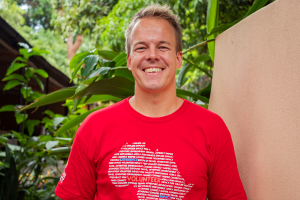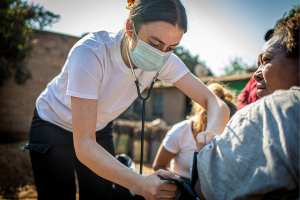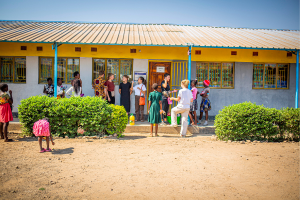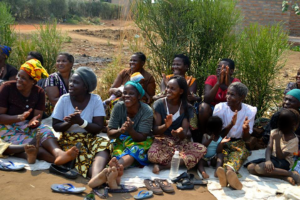Empowering Communities: Insights from Sander’s Nine-Year Journey in Zambia
In this exclusive interview, we delve into the inspiring journey of our site director, Sander, who has called Livingstone, Zambia, home for over nine years. A dedicated member of our Africa team, Sander relocated to work with the local community and has since become a passionate advocate for their development. His commitment to the mission in Africa—to create positive, sustainable change—is evident in the long-term, meaningful relationships he has fostered in the region.
What distinguishes our team from many other non-profit and volunteer organisations operating in Africa is the focus on sustainable, community-driven initiatives. While others may engage in short-term projects, we prioritise a long-term approach that truly benefits local communities. This long-term approach is why we partner with Sander and the Africa team, offering transformative volunteer (WIL) programs in Livingstone. These programs—Community and Healthcare Development, Community Development and Environmental Change, and Women’s Empowerment—provide students with an unparalleled learning experience.

Meet Sander: After beginning his journey in Zambia as a volunteer in 2014, Sander returned a year later as a staff member and is now the Base Manager. Originally from the Netherlands, Sander is dedicated to supporting meaningful community initiatives with no plans to leave.
What immediate and long-term impact do volunteers have on the community?
Volunteers play a significant role in both the immediate and long-term wellbeing of the community. For example, healthcare volunteers provide essential home-based care, directly contributing to the community’s health. In contrast, those involved in community development, environmental change, and women’s empowerment programs help to create lasting change through education. Education is a key component of each of these programs and has significant flow-on effects which lead people to better jobs, better incomes, better health and in-turn being better able to support their family, friends and community. Each program is developed in close collaboration with local community representatives to ensure the programs are culturally sensitive and will have positive, lasting impact.
What challenges do volunteers often face during their placement, and how do they overcome them?
One of the most significant challenges volunteers face is undoubtedly culture shock. The cultural differences between Africa and countries like Australia can be striking. Volunteers often find themselves immersed in a way of life that’s both unfamiliar and eye-opening, revealing not only the beauty of the local community but also the complexities they face. Everyday practices and priorities can differ greatly—what might be considered urgent in Australia, for instance, may not carry the same level of urgency in Zambia. This difference extends even to language, where subtle nuances can be challenging to navigate. For example, when a Zambian says “now,” it could mean now, in a few hours, soon, or even in a few days. Nuances such as this can be surprising for volunteers. Embracing these differences help volunteers to adapt, develop cultural sensitivity, and a deeper understanding of the community.

How do community interactions help shape students’ understanding of community and environmental issues?
Community interactions play a vital role in shaping students’ understanding of both social and environmental issues. Our Zambian staff accompany volunteers into various communities, allowing them to learn firsthand about Zambian culture—not only through the villages they visit but also through the insights shared by the staff themselves. This provides an opportunity for volunteers to ask questions and engage in meaningful discussions about what they’re seeing.
For instance, in our women’s empowerment initiative, one of our women’s groups conducts village excursions that serve as an income-generating activity. During these excursions, volunteers are shown around different villages, learning about daily life, local occupations, and traditional snacks. This exposure helps them gain a deeper understanding of issues like the lack of waste management systems, limited access to healthcare, and restricted educational opportunities beyond Year 7.
To address environmental issues, we’ve established an eco-club for Zambian students, where volunteers participate in discussions about climate change and waste management. Through litter collection efforts, we emphasise the importance of reducing and recycling waste. Our swap shop encourages local students to create eco-bricks from collected plastic, which can be exchanged for small rewards. These eco-bricks are then used to build structures in schools. Through these interactions, student volunteers gain valuable insights into the challenges faced by communities like Livingstone.
What skills do student volunteers develop during their time on the programs?
So many! A surprising skill that I see volunteers develop time and again is communication skills. They often arrive feeling shy and unsure but they quickly learn greater resilience and confidence when communicating with the locals. Volunteers also gain practical skills by participating through the hands-on activities of each program – whether it’s the home-based care, creating workshops for teenage girls around health and education or other activities.

What changes do you see in volunteers between when they first arrive and when they leave?
The biggest change I see in volunteers is the increase in their knowledge. Largely from the program itself as they learn through hands-on activities that enhance their work experience in their field of study. For example, sustainability and environmental students go home with greater knowledge of innovative, ecological methods for building safe structures by being directly involved in our eco-brick project. Surprisingly, their knowledge of other cultures expands, not just about Zambia, but also other cultures around the world as they interact with other international volunteers. Big picture, they also leave with greater knowledge and awareness around global issues like HIV, maternal and children’s health, food security and more.
What is one thing you’d like people to know about Africa and the Livingstone programs?
We’ve talked a lot about the issues but what I want people to know is that it’s such a beautiful country. The people here are lovely. I haven’t travelled to a country where the people are nicer than the people in Zambia. Yes, there’s issues, but if you only look at the issues, you can’t see its beauty. Africa is often labelled as a developing continent but it has so much more to offer. There is a lot of generosity and people are very community-minded with strong family values. No one is left behind. For example, even when you see homeless people on the street, it’s often those with limited resources who are the quickest to lend a helping hand. No one stands alone.

Sander’s comments highlight the profound impact of our volunteer (WIL) programs, not only on the local communities but also on the volunteers themselves. Through hands-on experiences and meaningful connections, participants leave with a deeper understanding of global challenges, stronger communication skills, and a broadened perspective on cultural and environmental issues. Africa offers more than just a volunteer opportunity; it provides a rich learning experience for students while also fostering their personal and professional growth. Discover how these transformative opportunities can support your students’ development into informed, compassionate global citizens—contact CISaustralia today to learn more or explore customised programming options tailored to your needs.
